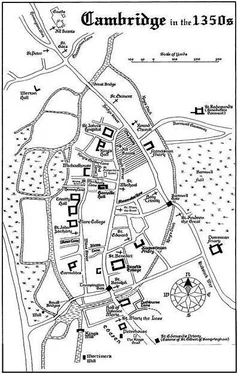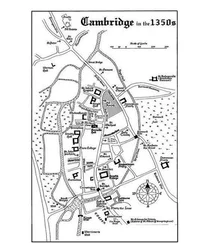Robin suffered from poor eyesight, and in dim light could not make out the words, either. He did not care what it said anyway, because parchment was parchment, and too valuable not to be reused. He scraped it clean with his knife, then rubbed it with chalk, and sold it for three pennies to Godric, the young Franciscan Principal of Ovyng Hostel. Robin went to spend his windfall on spiced ale at the King’s Head; Godric walked home and spent the afternoon composing a moving and eloquent prayer, which he wrote carefully on the parchment.
Shortly before midnight, Godric rose and rang a small handbell to wake his students, then led them in a solemn, shivering procession through the streets to St Michael’s Church, where he recited matins and lauds. When the office had been completed, he went to the mound in the churchyard that marked the place where his predecessor had been laid to rest a few weeks before. He scraped a shallow hole and laid the prayer inside, before bowing his head and walking away.
Bosel watched intently from the shadows thrown by a buttress. When Godric had gone, he moved forward, alert to the fact that Cambridge was a dangerous place at night and that beggars were not the only ones who lurked unseen in the darkness. He reached the grave and crouched next to it, hoping the Franciscan had buried something valuable – something that could be sold to raise a few coins for ale or a good meal. He was disappointed to discover parchment, and swore softly as he reburied it. He considered taking it to Robin, but only briefly. For all Bosel knew, the jumble of letters might comprise a curse, and only the foolish meddled with those sorts of things. He patted the earth back into place and wondered where he might find richer pickings that night.
As he pondered, he became aware that he was not the only one in the churchyard. He could hear voices as two people argued with each other. Knowing that conversations held among graves at the witching hour were unlikely to be innocent, and that witnesses might well be dispatched, Bosel shot back into the shadows, hoping he had not been seen. He waited, his body held so tensely that every muscle ached with the effort. When no cries of pursuit followed, he began to relax. Then he grew curious, wanting to know what business pulled folk from warm beds on such a damp and chilly night. He eased around the buttress carefully and silently, until he could see them.
He recognised both immediately. One was Thomas Deschalers the grocer, who was the wealthiest merchant in the town. He was also the meanest, although in the last couple of weeks he had deigned to toss Bosel a few coins, and had even taken to having bread and old clothes dispensed from his back door of a morning. The other was a popular Carmelite scholar called Nicholas Bottisham. Bosel liked Bottisham: he was generous, and never too busy to bless beggars if they called out to him. Bosel could not help but wonder what the gentle friar and the arrogant merchant could have to say to each other.
‘I do not know about this,’ Bottisham was saying uneasily. ‘Even you must appreciate that it is an odd thing to ask me to do.’
‘I know.’ Deschalers sounded tired. ‘But I thought–’
He stopped speaking abruptly when the night’s stillness was broken by the sound of marching feet, the clink of armour and the creak of old leather.
‘It is the night watch!’ exclaimed Bottisham in an alarmed whisper. ‘I do not want them to find me here with you, when I should be at my prayers inside. The answer to your question is no.’
Deschalers released what sounded like a groan. ‘But I assure you, with all my heart–’
Bottisham cut across his entreaties. ‘No – and that is the end of the matter. But I must go, or my colleagues will wonder what I have been doing.’
And then he was gone, leaving the grocer standing alone with his shoulders slumped in an attitude of defeat. Bosel pushed himself deeper into the shadows as Deschalers trudged past, sensing that this would not be a good time to make an appeal for spare change. The conversation was exactly the kind folk usually wanted to keep to themselves, and Bosel knew better than to reveal himself. He shuddered, supposing it was something involving money or power, neither of which Bosel knew much about. He decided to forget what he had seen. It was safer that way.
Cambridge, March 1355
Thomas Mortimer the miller was drunk again. He had managed to climb on to his cart and take the reins, but only because his horses were used to his frequent visits to the town’s taverns, and knew to wait until he was safely slumped in the driver’s seat before making their way home. His fellow drinkers at the Lilypot Inn raised dull, bloodshot eyes from their cups to watch, but these were men for whom ale was a serious business, and the spectacle of an inebriated miller struggling into his cart did not keep their attention for long.
It claimed someone’s, however. Brother Michael, the University’s Senior Proctor and Benedictine agent for the Bishop of Ely, who taught theology at Michaelhouse when his other duties allowed, fixed the miller with a disapproving glare.
‘If Mortimer were a scholar, I would have him off that cart and imprisoned for driving dangerously, not to mention public drunkenness,’ he declared angrily. ‘But he is a townsman, and therefore outside my jurisdiction. The Sheriff and the burgesses will have to deal with him.’
‘They have done nothing so far,’ said Matthew Bartholomew, Master of Medicine at Michaelhouse, who strode at Michael’s side. ‘He knocked his rival miller across that snowdrift outside Bene’t College two weeks ago, and he will kill someone if he continues to drive when he can barely stand upright. The burgesses listened politely to my complaints about him, but said they do not want to offend the Mortimer clan by ordering Thomas off his cart.’
Michael shook his head in disgust. ‘They are afraid that if they do, then the Mortimers will refuse to donate money for repairing the Great Bridge.’
The two scholars had just left Merton Hall, where they had taken part in a lively debate on the neglect of mathematics in academic studies, and were on their way to Gonville Hall. They had been invited to dine there by William Rougham, one of Bartholomew’s medical colleagues. Bartholomew did not like Rougham, whom he found narrow-minded and dogmatic, but he felt obliged to suppress his feelings as well as he could, given that he and Rougham comprised exactly half of the total complement of physicians in Cambridge. So many medics had died during the plague that they were still in short supply, despite the best attempts of the University to train more.
It was a pleasant early spring day, with the sun dipping in and out of gauzy white clouds and trees beginning to turn green with buds and new leaves. A crisp breeze blew from the east, bringing with it the scent of freshly tilled soil from the surrounding fields. Bartholomew inhaled deeply, savouring the sweetness of the air at the northern outskirts of the town. A few steps ahead lay the Great Bridge, a teetering structure of stone and wood, and beyond this the air was far less fragrant. Fires from houses, Colleges, hostels and businesses encased Cambridge in a pall of smoke, almost, but not quite, strong enough to mask the stench of human sewage, animal manure and rotting rubbish that lay across the streets in a thick, fetid, greasy brown-black blanket.
The Great Bridge was heavily congested that morning. It was a Wednesday, and traders from the surrounding villages streamed towards the Market Square to sell their wares – sacks of grain and flour, noisy livestock, brown eggs wrapped in straw, winter vegetables past their best, and rough baskets and mats woven from Fenland reeds. Agitated whinnies, baleful lows and furious honks and hisses expressed what the animals thought of the tightly packed, heaving throng that jostled and shoved to cross the river.
Читать дальше












